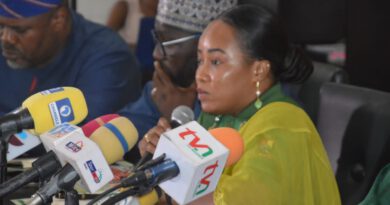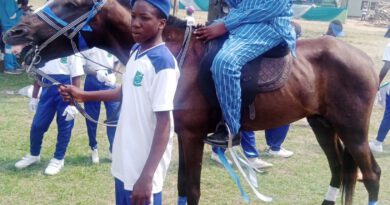Local Vessel Construction: Customs Boss Called For Private Participation Partnership To Be Own By Nigerians
.
Raheem Ibrahim.
As a way of boosting international trade and the maritime industry,
The Comptroller General of the Nigeria Customs Service (NCS), Adewale Adeniyi has implored well to do nigerians to come together and start the local construction of vessels along with the government, instead of waiting for the foreign bigger vessels which are not available at the moment.
.
Speaking at the recent Annual Finance Conference organised by the Association of Maritime Journalists of Nigeria (AMJON) in conjunction with the NLNG Shipping and Marine Services Limited (NSML) in Lagos, Adeniyi who was represented at the event by Comptroller Dera Nnadi, Customs Area Controller CAC of Tincan Island Customs command, said that vessel construction needed to be given necessary supports in the country.
He emphasised that vessels are sine qua none to effective and efficient international trade, revealing that Customs have introduced barge operations to ease movement of cargoes in a little way which later because a large investment in the maritime industry.
According to him, “In order to support and sustain such move such low hanging fruit as construction of smaller and local vessels need to be encouraged especially now that the president has given the needed support. We should look inwards particularly at this time we are experiencing scares resources, Mr. President is encouraging us to look inwards and encourage home grown technology to move forward.
The Customs boss remarked, “We need to appreciate locally constructed vessels. We don’t need to wait until we build bigger vessels before we can exercise our expertise. We can’t wait until we have bigger forces to construct bigger vessels, we can start with smaller ones, the lower hanging fruits,” the CGC”.
Meanwhile, the Area Controller of Apapa Port Command of Nigeria Customs Service (NCS), Comptroller Babatunde Olomu, has said that low utilization bane of Advance Ruling, AEO, Time Release.
Calling for adequate sensitization of stakeholders, Olomu emphasized that Advance Ruling (AR) is a tool provided by the Customs Authority in advance of trade transactions which offers clarity on the classification, valuation and origin of goods, providing businesses with predictability in customs processes.
Lamenting that many stakeholders in Nigeria are unaware of the existence of the AR or its benefits, leading to underutilization, he said “So I am using this medium to inform the key stakeholders especially importers and exporters of goods to make use of this mechanism in fast tracking their businesses”.
In his contribution at the 2024 edition of the Association of Maritime Journalists of Nigeria (AMJON) annual Maritime Finance Conference, he noted that the application process of AR could be cumbersome and time-consuming, thereby deterring potential applicants from using the process.
He advised, “Nevertheless, it’s worth inculcating into your (importers/exporters) schedule or business plans”.
The Apapa Customs CAC who was represented by Evelyn Enweani, a Superintendent of Customs (SC), also observed that some Customs brokers may lack the necessary expertise to provide accurate and timely rulings on complex trade scenarios, but affirmed that customs officers are always on ground to assist the importers and exporters navigate the processes of AR for proper implementation.
Comptroller Olomu, who listed the challenges of Automated Economic Operator (AEO) programme as high cost of compliance, limited benefits and lack of harmonisation added, “Time Release is not insulated from challenges, saying hurdles that needed to be crossed includes; inefficient documentation, lack of technology and corruption.
To addresses these challenged and optimize the effectiveness of Advance Ruling, AEO and Time Release mechanisms, he proposed the following recommendations:
“Enhanced awareness campaigns- Conduct targeted awareness campaigns to educate stakeholders about the benefits of those initiatives. Implified procedures- Streamline the application processes for Advance Ruling and AEO certification, reducing administrative burdens
He said, “Capacity Building- Invest in training and capacity building for both customs officers to enhance their expertise in trade facilitation. Technology Adoption- implements modern technology solutions to automate customs clearance processes and improve efficiency.
“Corruption prevention- strengthens anti-corruption measures within CTTlomstoms agencies to ensure transparency and accountability; and public-private partnerships- foster collaboration between customs authorities and the private sector to identify and address trade facilitation challenges,” Olomuh said.
He stated that the Nigeria Customs Service plays a vital role in facilitating international trade; saying “by effectively implementing Advance Ruling, AEO and Time Release Study/mechanism, the Service contributes to a more efficient, competitive, and prosperous trading environment. that addressing the challenges and issues associated with these initiatives is essential for optimizing their benefits and promoting sustainable economic growth.



